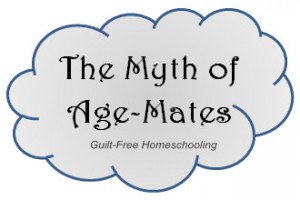Family A chose homeschooling because their children were lagging behind in public school, and their homeschooled cousins were excelling. After only one year at home, the A. children were returned to public school and Mrs. A. vowed she would never homeschool again. What went wrong? Plenty. The high-school-aged student thought homeschooling to be the most boring year ever — sitting around all day, every day, “just reading books.” The upper elementary and middle school students tried to do their work at the kitchen table, while the preschool-aged siblings climbed all over them, chasing after the (many) other preschoolers and toddlers that Mom was babysitting. (The home’s arrangement put the kitchen table in the middle of the little ones’ main play area.)
Very little discipline, poor curriculum choices, and no outside support made for an unpleasant homeschooling experience. However, when these children did return to public school, they had advanced two grade levels to be at least equal with their peers (showing there are benefits to even disorganized homeschooling).
Lessons to Be Learned: Seek advice from experienced homeschoolers on matching curriculum to your students; allow your students to have input on what specific interests they would like to pursue. Set aside time for interaction with other homeschool families — you will all benefit from the fellowship. Do not over-commit yourself at the same time that you are learning to homeschool — homeschooling is a full-time job all by itself. Do not give up right after you’ve learned how to do this job — the first year is the toughest.
Family B homeschooled from Kindergarten onward, attempting to cover every possible subject for which there was curriculum available. Dad was self-employed, so Mom was also assisting in managing the responsibilities of a small, but growing, enterprise. Dad was a firm disciplinarian (read: control freak). Every few years Dad insisted on sending the kids to private Christian school for a year to be sure they were not missing anything. Mom would have preferred the consistency of continuous homeschooling, but gave in because she was constantly on the verge of a breakdown.
Lessons to Be Learned: Do not attempt to Do It All — this family overwhelmed themselves by trying to do too many unnecessary things and sacrificing their more important family relationships. Do not underestimate your ability to educate your children — they may not be learning exactly what other children are learning, but your children are learning the things that are important to your family. When all else seems to fail, re-evaluate your standards: are you putting forth your greatest effort toward the things you consider to be the most important?
Family C was anxious to keep up with the other homeschoolers at their church, so they began Kindergarten with their barely-4-year-old. When I met them a year later, that student was in first grade and the next-in-line was now doing Kindergarten. The two toddlers were normally active, but Mom was so enthusiastic about doing history, science, and many other extra classes with her students that she did not always keep a close eye on the younger children (who therefore constantly got into trouble). Mom eventually gave up and put the students into Christian school. I should mention that Mom was also working part-time outside the home during all this — while Dad’s income alone was more than adequate to support the family. They were planning to try homeschooling again later on when Dad’s job transferred him for a year to an area with inadequate schools, but I have lost contact with them and have not heard how that went.
Lessons to Be Learned: Once again, do not attempt to Do It All. More intense subjects (such as history and science) cannot be retained efficiently by younger learners; save them until the students have mastery of reading (at least 4th grade). History and science activities can be done occasionally to supplement other subjects, but save the formal lessons for later. Include your toddlers in your schooltime by giving them their own “school activities,” whether directly related to the lessons or not.
Family D homeschooled for several years, dual-enrolling their children in public school for extra-curricular classes and activities. Mom spent most of her time driving to the school (then back) to deliver each of her children in turn for lessons, practices, and performances. The oldest child entered high school and enrolled in even more classes and spent many hours at the school each day. The D. family has not really failed at homeschooling itself, but these children are spending ever-increasing time with public school peers and are readily adopting the prevalent attitudes and (anti-) social behavior. The siblings are mouthy, disrespectful, and frankly, no fun to be around. I used to really like these kids.
Lesson to Be Learned: The point of homeschooling is to give our children a better environment and a better education. (How can that happen if you keep putting them right back into public school?)
Family E wanted to “sample the homeschool movement,” so their last child at home was to be homeschooled for one year only, and then returned to public school. They used the school’s curriculum, but also added several extra Bible-based programs in order to get what they considered to be “the best of both worlds.” Another example of trying to do everything at once, the E. family happily (and exhaustedly) turned back to the government system after their one-year trial. Refusing to call this a failure, they instead consider themselves to have been true homeschoolers.
Lesson to Be Learned: I personally consider this family’s experiment to have been as much fad-behavior as wearing stick-on tattoos, and I feel they got the same long-lasting benefits. Know why you are homeschooling. You will get out of it what you put into it.
Family F was similar to Family A, in that they had a very active toddler vying for the attention that the older siblings were getting during schooltime. Mrs. F. (like so many other eager new homeschoolers) wanted to jump right in and do every subject imaginable. Mom spread herself much too thin, felt over-obligated with the schoolwork and guilty for neglecting the toddler, and convinced herself after a year that public school was a better alternative. Mrs. F. deeply misses the relationship with her older children, but is now happily spending more time with her youngest. I still hope she will try homeschooling her children again when the youngest is ready for school.
Lesson to Be Learned: Avoid trying to Do It All, include your little people at their own level, and do not consider yourself a failure simply for over-committing yourself.
Guilt-Free Homeschooling is achieved by
1) Doing what God has asked you to do, not what all of your friends or relatives are doing or may expect you to do.
2) Spending some time reflecting on all your reasons for educating your children at home and writing those reasons down so you can look back over them whenever you need a reminder.
3) Looking after your own family’s needs first and only extending your efforts to others as you have the time, energy, and resources to do so. (Your own family should not suffer because you are taking care of others’ needs instead of theirs.)
4) Reserving time occasionally for your family to interact with other homeschooling families (Moms, Dads, and children) — for educational activities, for fellowship, for support, or just for fun.






 Guilt-Free Homeschooling is the creation of Carolyn Morrison and her daughter, Jennifer Leonhard. After serious disappointments with public school, Carolyn spent the next 11 years homeschooling her two children, from elementary to high school graduation and college admission. Refusing to force new homeschooling families to re-invent the wheel, Carolyn and Jennifer now share their encouragement, support, tips, and tricks, filling their blog with "all the answers we were looking for as a new-to-homeschooling family" and making this website a valuable resource for parents, not just a daily journal. Guilt-Free Homeschooling -- Equipping Parents for Homeschooling Success!
Guilt-Free Homeschooling is the creation of Carolyn Morrison and her daughter, Jennifer Leonhard. After serious disappointments with public school, Carolyn spent the next 11 years homeschooling her two children, from elementary to high school graduation and college admission. Refusing to force new homeschooling families to re-invent the wheel, Carolyn and Jennifer now share their encouragement, support, tips, and tricks, filling their blog with "all the answers we were looking for as a new-to-homeschooling family" and making this website a valuable resource for parents, not just a daily journal. Guilt-Free Homeschooling -- Equipping Parents for Homeschooling Success!

Recent Comments